On Thursday in the Western District of Washington, Amazon.com, Inc. filed a complaint against individuals Kelly Fitzpatrick and Sabrina Kelly-Krejci and 11 businesses; the individual defendants are influencers that allegedly engaged in “promoting, advertising, and facilitating the sale of counterfeit luxury fashion goods by the Seller Defendants.” Amazon contended that the defendants have violated its policies and various laws.
Moreover, Amazon asserted that the defendants “engage in a sophisticated campaign of false advertising for the purpose of evading Amazon’s counterfeit detection tools.” Specifically, defendants Fitzpatrick and Kelly-Krejci “publish videos, photographs, and detailed descriptions of clearly infringing products in their social media and other websites and apps, and link to offer listing pages in the Amazon store.” In particular, the defendants promoted on Instagram, TikTok and their own websites. According to the complaint, the defendants refer to their promoted products as “dupes,” which is “a fashion industry term that connotes items that may have similarities to a designer item but that do not copy logos or trademarketed features.” However, Amazon alleged that the items that the defendants advertised and sold are not “dupes,” rather they are “obviously counterfeit goods that blatantly copy the registered trademarks of luxury brands. Furthermore, Amazon noted that oftentimes, “the Amazon pages display only a generic, seemingly non-infringing product.” Specifically, the defendants used an “Order this/Get this!” marketing scheme, as well as hidden links, whereby a product listing “shows a generic, non-infringing item but the product that is actually delivered is different from what is shown” in order to only reveal the true product to those who ordered it.
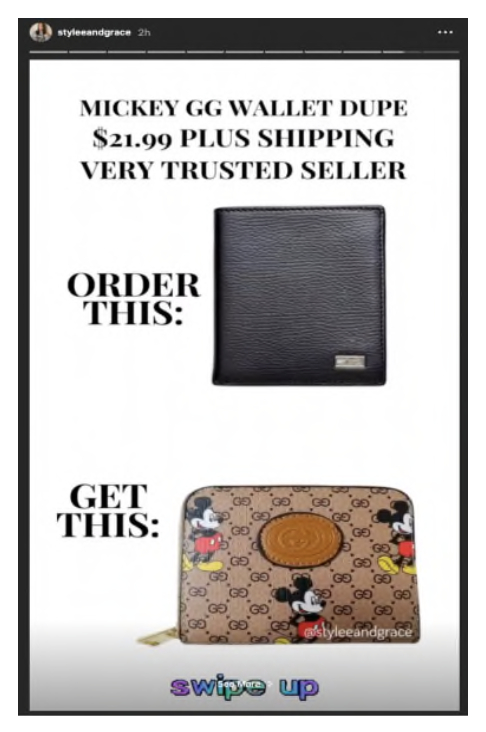

Specifically, Fitzpatrick allegedly noted that the hidden link allows a consumer to “order a certain product that looks nothing like the designer dupe in order to hide the item from getting taken down [by Amazon] and orders being cancelled.” Therefore, under this purported scheme, a consumer could order a product that appeared to not infringe in order to get a counterfeit item, which Amazon alleged is “false advertising,” claiming that the products on the defendants’ Amazon pages are “false placeholder[s] designed to evade Amazon’s counterfeit detection systems” and that the defendants ship the counterfeit goods to consumers once the order is placed. However, Amazon proffered that it immediately blocks these links once it becomes aware of their infringement. But Amazon claimed that the individual defendants “are persistent in their promotion of counterfeit items”; when social media companies, apps, and websites remove the defendants’ accounts, the individual defendants allegedly “created new accounts to continue their illicit activities.”
Additionally, Amazon noted that Fitzpatrick joined the Amazon Associates program in November 2019, which “works with legitimate social media influencers…and helps them monetize their traffic by earning fees for sharing Amazon products with their followers.” However, in March 2020 she was warned that she was advertising counterfeit goods in violation of the program and her account was closed. She attempted to open two additional Amazon Associate program accounts, at least one of which Kelly-Krejci held Fitzpatrick open, but Amazon also closed these accounts. Fitzpatrick allegedly continued to promote these counterfeit goods through other means. Moreover, Amazon purportedly detected and blocked defendant Kelly-Krejci’s scheme, after which she began to direct her followers to purchase goods through her own website.
Furthermore, Amazon averred that the defendants do not attempt to conceal their motivation for their scheme: “[h]iding the counterfeits from Amazon, which employs sophisticated brand protections to prevent infringing items from ever being advertised in the Amazon store.” In particular, Amazon claimed that it “invests a vast amount of resources to ensure that when customers make purchases through the Amazon store—either directly from Amazon or from one of its millions of third-party sellers—customers receive authentic products made by the true manufacturer of those products,” such as its Amazon Brand Registry, Amazon Project Zero and tools to report an IP violation, among other measures. Additionally, Amazon stated that its increasing efforts to remove these pages and products led to the defendants to direct followers to other websites to purchase these purported “dupes.”
According to the complaint, Amazon investigators made several test purchases as part of their investigation. The advertised image took the investigator to an amazon page without the Gucci logo, but when the investigator placed an order a counterfeit version made to imitate the legitimate $470 belt arrived.
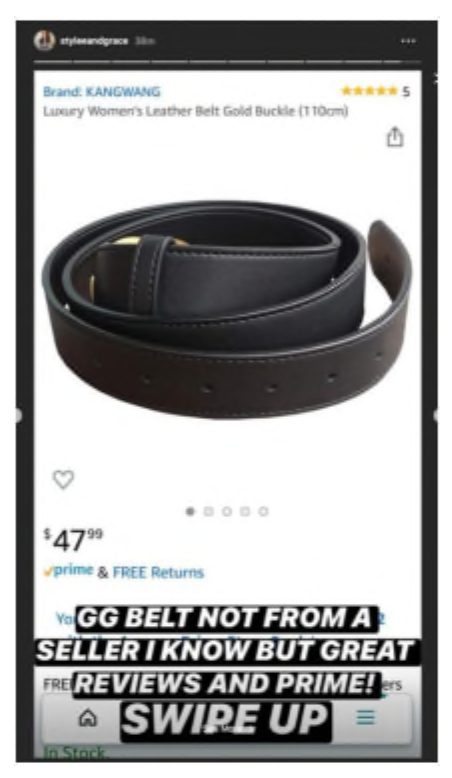
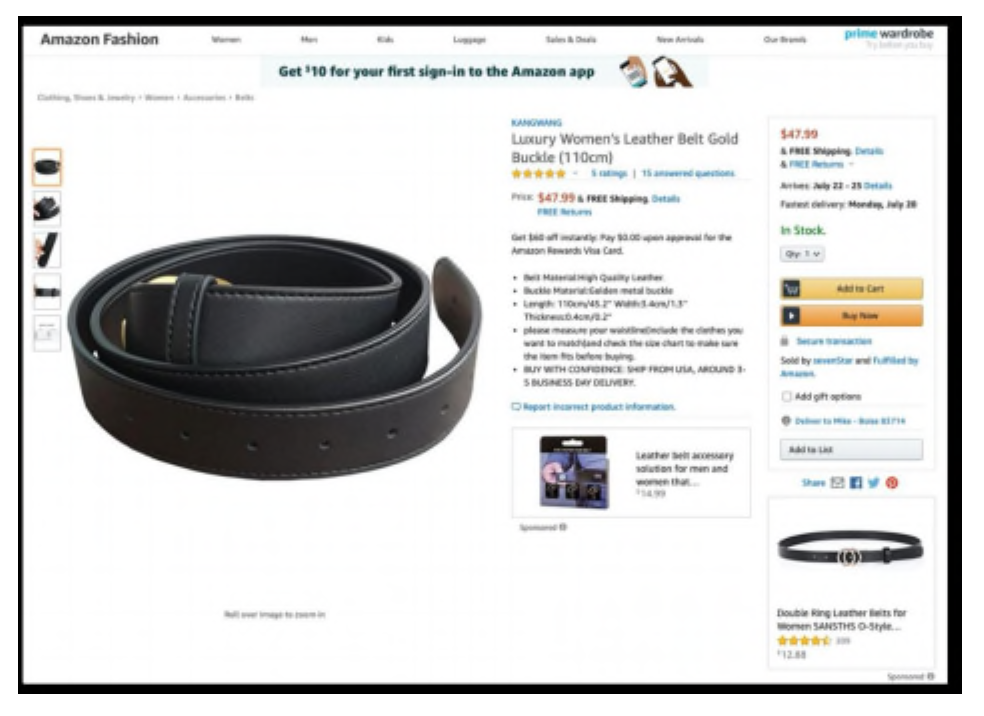
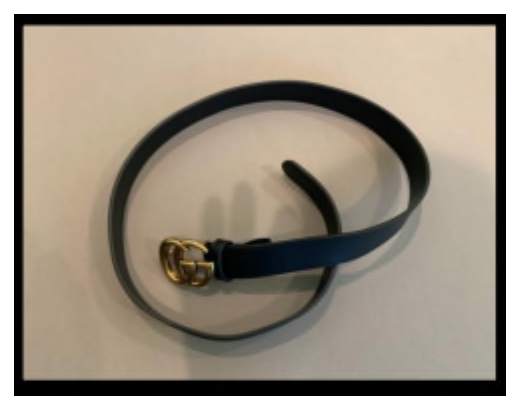
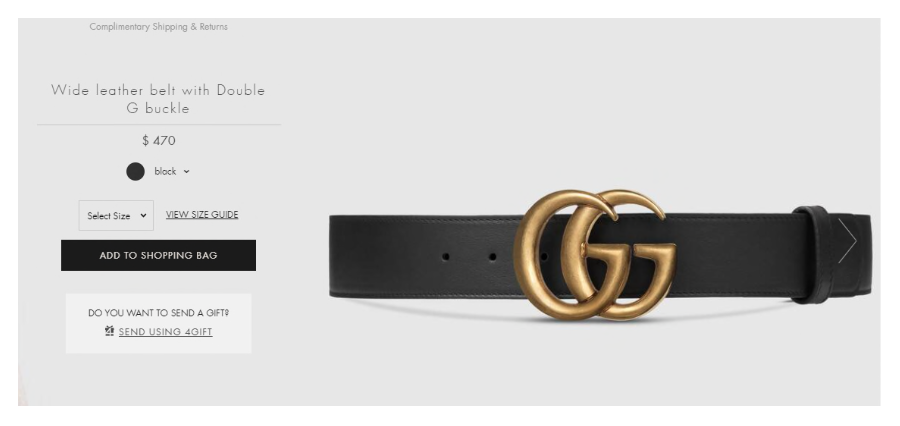
“These defendants were brazen about promoting counterfeits on social media and undermined the work of legitimate influencers,” Cristina Posa, Associate General Counsel and Director, Amazon Counterfeit Crimes Unit, said. “This case demonstrates the need for cross-industry collaboration in order to drive counterfeiters out of business. Amazon continues to invest tremendous resources to stop bad actors before they enter our store and social media sites must similarly vet, monitor, and take action on bad actors that are using their services to facilitate illegal behavior.”
Amazon asserted that the defendants’ behavior takes advantage of and deceives consumers, infringe and misuse the trademarks and intellectual property of the products’ legitimate manufacturers, deceives Amazon and harms its brand and reputation.
The counts against the defendants include false designation of origin and false advertising, contributory false designation of origin and false advertising, and violation of the Washington Consumer Protection Act.
Amazon has sought to permanently enjoin the defendants from their illicit conduct, declaratory judgment in its favor, for the defendants to provide full and complete counting of all amounts due and owed to Amazon, an award for damages, an award for costs and fees, and other relief.
Amazon is represented by Davis Wright Tremaine LLP.

